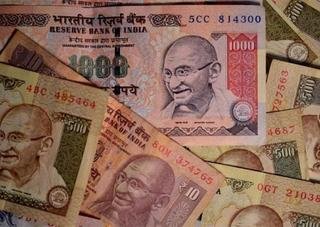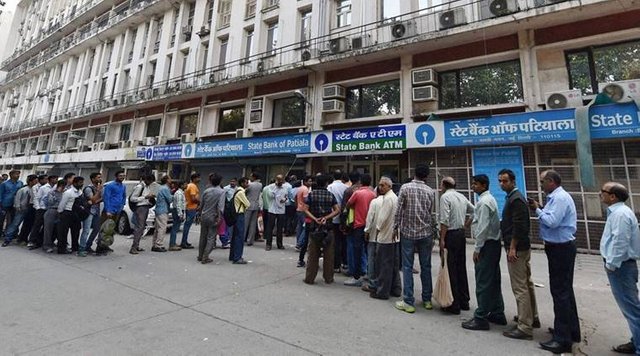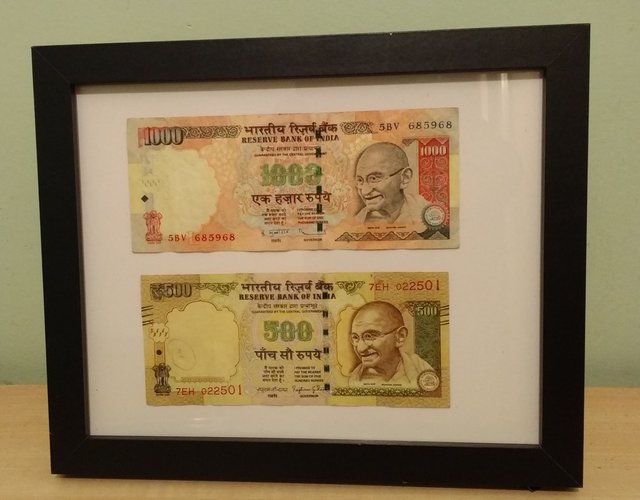In the Midst of Indian Demonetization

I had the misfortune of being in India during the shock announcement of 'demonetization'. This was an announcement, out of the blue, on the evening of November 8th 2016 declaring that all 500 and 1000 rupee notes were not legal tender at the stroke of midnight. These are the two largest denomination notes in India and account for 86% of the money supply. As you can imagine, it created mass chaos and confusion. To be in the middle of that mass chaos and confusion gave me a real life glimpse into monetary events only read about in history books.
So Why Was It Annouced?
The Indian Prime Minister, Narendra Modi addressed the nation on TV announcing the plan to demonetize the notes. The plan involved depositing all the old 500rs and 1000rs into bank accounts. There were no questions asked for deposits of up to 250k rupees but if depositors wanted to place more into their accounts, there had to be proof of where the cash came from. If the explanations were not reasonable, depositors were liable to pay a 200% tax on that unaccounted deposit. Exchanging old 500rs and 1000rs notes at the banks occurred in the smaller denominations of 10rs, 20rs, 50rs,100rs and the new 500rs and 2000rs denominations. As reliquifying the system with new notes would take a while, this exchange of old notes were limited to 20k rupees per week. Digital transactions in the form of card payments and bank transfer would carry on as normal - although these form a small percentage of all transactions, India is still very much a cash based economy. Many vendors still don’t accept cards and the necessity of cash is vital on a day to day basis.
The main reason given for demonetization was to curb the use of illicit 'black money'. This is the term used for cash transactions that are not reported to avoid paying taxes, a practice which is widespread in India. The theory of demonetization is that those who are heavily involved in these black money transactions often have large amounts of cash on hand at any given time. This shock announcement didn't allow the black money hoarders to move into other assets in a few short hours. They wouldn't have an avenue of changing these old notes, as, if they tried to deposit large amounts of notes into the bank it would raise uncomfortable questions and a threat of a 200% tax being levied. They were in effect stuck with piles of worthless paper. Or so the theory goes.
So What Happened on Ground Level?
It sounds reasonable and straightforward enough. But what the government didn’t seemingly account for was the public’s ingenuity and desire to avoid paying taxes. This in turn led to some economic behaviours that few academic economists could have predicted. The first of these was in the few hours till the midnight deadline, many flocked with their soon to be illegal notes to gold shops. They wanted to get out of paper and store their wealth in the oldest form of money and it was exchanging for a large premium above the international price. In the city I was residing in, there were stories of police having to close gold shops at 1am due to disturbances in the queue. This fleeing into ‘safe haven’ assets has happened subsequently online, where bitcoin is trading significantly higher on Indian exchanges compared to international markets.
Another phenomenon occurred in the following days. Adverts were popping up on social media for ‘money changers’. These entrepreneurs sensed an opportunity. They would pay for the old notes in smaller denominations for less than face value. The people wanting to get rid of their old notes were happy to take the haircut as they didn’t have means of depositing their cash. The money changers who had means to deposit(either by knowing bank staff or having people deposit for them) would then make a profit as the notes would be face value in their digital bank account.
Others, with large hoards of cash avoided the tax questions by getting multiple people to individually deposit money into their accounts. I met one gentleman, who had 3 million rupees in cash and he managed to persuade 12 of his employees to deposit the 250k limit into their personal accounts which would be later withdrawn when the system fully reliquified. This ‘illicit’ money was deposited without any tax questions.
And you didn’t need 12 employees either. There were countless anecdotes of banker fraud in a country where corruption is all too common. Hoarders who had no means to prove their cash pile often paid bank staff a fee to deposit without any tax questions getting asked. Would you rather forfeit 100% of your cash, pay 200% tax to the government or pay a banker 30% of your deposit? They understandably found the last option more appealing.

Banks lines after the demonetization announcement.
Those that were able to swap their old notes for smaller denominations at the banks were the lucky few. It soon became apparent that there was a shortage of small denomination notes. The queues at the banks were hundreds of metres long and they were running out cash by mid morning most days. People wanted cash, but there wasn’t enough in circulation to go around. Naturally these small notes became like gold dust and now the public were willing to exchange their old 500 and 1000 notes for less than face value just to get hold of the smaller notes. These weren’t the black money hoarders, these were ordinary citizens willing to take less money for access to cash. Let me repeat that, people were willing to take less than face value for their legally earned notes because of a shortage of cash. The money changers were making a killing.
And when depositors got their hands on the new 2000rs note, they found problems with actually spending them - many vendors would not accept them as giving out change in smaller denominations meant they themselves were short of cash. In effect, these new notes were worthless in the short term if vendors were unwilling to accept them.
What became apparent was that those who were connected were able to get their hands on more notes than the rules and regulations would allow. I was in a shisha bar a few days after the demonetization announcement and a gentleman was showing the new 2000rs around. On further questioning, he had somehow managed to get his hands on 40k in new 2000rs notes, only a few days after demonetization. How was he able to get his hands on so much? The obvious answer and common thread - connections in the right places and corruption.
Going Forward
I left India on the 18th of November. There were still massive queues at the banks, there was still a mad scramble for cash and few had sufficient cash to spend like normal. I had mixed feeling about leaving, I enjoyed my time but there was a sense of relief I was leaving as I could envisage problems in the near future.

A framed demoneitzed 500rs and 1000rs note sitting on my desk. A memento of my trip.
By the time I left, many around me had altered their spending habits. This was a natural response, as only spending on essentials is a sensible option in times of a personal cash shortage. But what if a large proportion of the population behaved in the same way at the same time? Imagine running a business that relied on constant cashflow and all of a sudden people were unwilling to spend as normal. In the short term the business would have cash flow problems and if they lasted a significant amount of time, they would eventually fail. Now imagine multiple businesses facing the same problem at the same time.
As mentioned with the man in the shisha bar, the redistribution of the notes have happened in an unequal manner. Those that are connected, will have more notes than those that are not. Many on the poorer end of the scale will have less access to these connections and in all likelihood less money than their more connected counterparts. This wouldn’t be such an issue if there was a turnover of cash. But as I saw, people were less likely to spend and therefore hoard their notes. If there is no turnover and people are short of cash, how will they have enough notes in the near future to buy the essentials?
You may say, the reliquifying process will solve that problem. But as of the 12th of December, roughly a third of the 1.5 trillion rupees taken out of circulation by demonetization have been replaced by the new 500rs and 2000rs notes. So if that reliquifying process is consistent, it will take another two months to fully swap the value of the old notes. As mentioned, many vendors aren’t currently accepting the 2000rs note so this is unlikely to increase the turnover of cash. The cash crunch will last longer than predicted which means many of the public will be short of cash for longer than predicted.
Again, you may say, why do people not just pay by card to avoid cash? The simple answer is that most vendors don’t have card machines, so this isn’t an option. The smart vendors are getting them installed but as with the reliquifying process, this is a relatively slow process which means it has little impact on the way transactions are made short term. Cash is still vital for everyday usage and if there is a shortage of cash as mooted above, the problems become apparent. And all this isn’t taking into account the many of ordinary citizens that didn’t even have bank accounts pre demonetization.
On a personal note, when the move was announced I had 10000 rupees in my pocket that essentially became worthless. Not only was it a bizarre feeling to have all your money drained away through no fault of your own, it gave me a rare insight into the massive importance of confidence in a monetary system. It doesn’t matter what you trade in, be it pebbles, sticks, gold or government issued paper the whole exchange relies on the recipient accepting the trading instrument because he knows he can spend it elsewhere. If he isn’t able to spend it elsewhere, he will not be willing to accept it. In one fell swoop, the government eroded that trust in the system. I believe this will have deep implications on a conscious or subconscious level on the Indian psyche in the future. If they know the government can act in this way at any point, there will always be a of lack of trust in government actions relating to monetary affairs. How can that invisible trust ever be restored? I don’t think it can.
In summation, the Indian economic system wasn’t ready for this kind of move. A cash economy with few card machines and a culture of corrupt and underhand practices are not going to change their habits overnight. Some say Indian culture needs that ‘shock therapy’ to change - but at what cost, short term? We will soon find out.
Thanks for a great post. Puts some new perspective on the current global monetary system.
We are sure many think this will never happen to them, but it seems this idea is spreading very quickly, most recently to Venezuela which has demonetised before issuing new higher denomination notes. How crazy is that?
Hold onto your hats folks, it's going to be a bumpy ride.
Upvoted.
Shared on twitter.
https://twitter.com/BullionTraderUK/status/808255365674631168
Disclaimer: I am just a bot trying to be helpful.
I am from India and I found your post to be the most engrossing on the subject I have read till date. Well written, and thanks for sharing!
Thanks. I wanted to share the story because in India this is the only news story but here in the UK only a few people are aware of it. The implications of this move are huge imv, I just hope it works out for the citizens of India.
Most of the people in India are doing cash transactions. This decision created lot of troubles to common man and still now the situation is worst. There is no cash in atms and banks also don't have enough cash for withdraws.
All the people I know in India are in the fairly well off middle class bracket. I checked in with a few of them before writing this post and many of them have altered their spending habits so they don't run out of cash. If they have to do this, I can't imagine how much change a man who exists hand to mouth is doing. It seems from the outside, a very ill thought out move whose consequences could be dire.
Upvoted and resteemed, great article
Great read! It gave me perspective and empathy. Thanks!
Congratulations @drkarl! You have completed some achievement on Steemit and have been rewarded with new badge(s) :
Click on any badge to view your own Board of Honnor on SteemitBoard.
For more information about SteemitBoard, click here
If you no longer want to receive notifications, reply to this comment with the word
STOPIf you want to support the SteemitBoard project, your upvote for this notification is welcome!